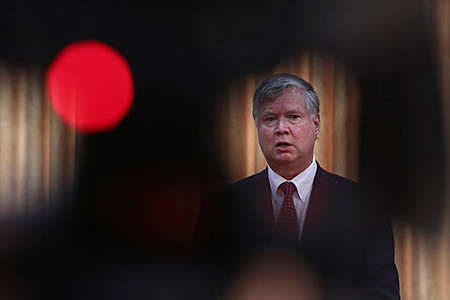
Stronger Russian influence in Belarus is a more favorable option for the U.S. than the strengthening of ties between Belarus and China.
U.S. Deputy Secretary of State Stephen Bigan has paid a visit to Moscow. In view of the high-ranking American diplomat’s sphere of competence, the subject of Bigan’s talks in Moscow was Belarus. However, it’s unlikely that the U.S. leadership’s concern for the situation in Minsk is the only reason for the increased attention it is giving to this country. It seems that Bigan’s mission is connected to the global political processes in which fate has engulfed the Republic of Belarus. What position does Minsk hold in Washington’s foreign policy strategy?
First of all, we need to consider that Washington and President Donald Trump’s main concern when it comes to foreign policy is undoubtedly China. Its growing economic and military power worries the American political elite significantly more than the fate of political prisoners in Minsk or Sviatlana Tsikhanouskaya’s meat cutlets. Beijing is seriously challenging the monopolar world order that the United States established during the decades following World War II and over the course of the Cold War. In the face of these challenges, Washington cannot be indifferent. The only option is to put direct pressure on Beijing, including threatening to destroy trade relationships.
But what’s Belarus got to do with it? The reach of the geopolitical competition between the two superpowers – the U.S. and the People’s Republic of China – is expanding to all the new regions. The post-Soviet space is playing a particular role in this confrontation because Washington still sees it as a “political vacuum,” meaning it is a highly attractive area both for the U.S. and the PRC. And at the same time as the collective West was completely rejecting the results of the elections in Belarus, Chinese President Xi Jinping was the first to congratulate Alexander Lukashenko on his victory. The facts speak for themselves. Nothing happens by accident in China. The increased attention being given to Belarus by Beijing and the blatant flirting between Lukashenko and Xi is no coincidence. The Belarussian dream of creating a new, prosperous Switzerland in Central Europe is based on calculations of Beijing’s support. But what can Minsk offer in return for this support, and in what way might Belarus interest the Chinese political elite?
Well, quite a lot. China has long been searching for a way to create control points in Europe. Lukashenko is taking any opportunity to mention the close economic and military-technical cooperation between the two countries. Considering the size of the Belarussian economy, it’s not worth Beijing pulling the country out of the current crisis in the hope that in the future Belarus will become a comfortable platform from which to increase exports to Europe. And for China, exports are not so much a luxury as they are a means of existing. The Celestial Empire cannot live without exporting a large part of its industrial production and without importing a significant proportion of its food provisions.
In light of the pressure from America, Beijing is looking more and more closely at the European theater of global politics. It is Europe that can and should, according to Beijing strategists, be a possible alternative to the U.S. market for the sale of Chinese goods. And in this case, a Belarussian financial and economic control base with a significant presence of Chinese banks and investors, through which Belarussian industrial enterprises can easily be transformed into affiliates of giant Chinese firms, is a potential way for China to prepare itself for the penetration of European markets. Such an arrangement is profitable for Lukashenko as it doesn’t entail obvious threats to Belarussian independence. Beijing is too far away to dominate the political elite in Minsk.
So, what about Moscow? Why did Bigan come to Moscow to discuss the situation in Belarus after he had already made conciliatory statements in Vilnius about how he doesn’t see any aggressive intentions from Moscow in relation to Minsk? Is it because a stronger Russian influence in its brother country is a more favorable option for the U.S. than the strengthening of ties between Belarus and China?
Moscow is, therefore, in an exceptionally difficult and delicate position. We are undoubtedly interested in a stable and prosperous Republic of Belarus. But the people who are now taking to the streets in Belarussian cities and going on strike are anything but Russia sympathizers. At the same time, a certain “Belarusization” has been taking place within leadership circles and Minsk’s state apparatus over the last few years, and it is not without a hint of anti-Russia sentiment.
The ideal way out of this situation would be Lukashenko presenting an offer of constitutional reform, over the course of which the situation in the country could stabilize and a political heavyweight could eventually appear – one more adaptable and accommodating than the sporty old man. Currently, there are no such heavyweights on the Belarussian political field.
As far as China is concerned, the expansion of the Celestial Empire’s presence in the Union State is unlikely to become a subject of serious concern for Moscow. Moreover, it could facilitate the materialization of several neglected ambitious projects for the Silk Road economic belt, which is objectively favorable for Russia because it holds out the prospect of generating profit from an increase in the transit of Chinese goods to Europe.
Taking all of this into account, Bigan’s conversations in Moscow will most likely end in handshakes and mutual assurances of dedication to democratic values and human rights. Moscow will not take any counter steps in response to American diplomacy’s anti-Chinese probing because of the Trump administration’s other geopolitical project: “The Group of Two,” which proposes strategic military cooperation between the U.S. and Beijing based on anti-Russian sentiment.

Leave a Reply
You must be logged in to post a comment.